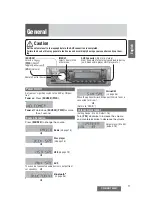
BBG-1002-2UDX-OM (V1.3)
BBG-1002-2UDX PRODUCT MANUAL
3-55
Operating Instructions
BBG-1002-2UDX Function Menu List and Descriptions
Ancillary Data Proc Controls
Provides controls for VANC/HANC ancillary data
de-embedding and embedding to and from program
video stream. Data can be extracted and inserted
within the device (Bridge mode), or inserted and/or
extracted to and from external interfaces via serial or IP
interfaces.
Note:
•
Separate Path 1 and Path 2 tabs are provided for this function with identical independent controls for both Path 1 and
Path 2. Only the Path 1 controls are shown here. Set controls for other path using the other tab.
•
Bridge mode ANC extract/insert is standard for both paths on device. Other modes described here are available with
option +ANC.
Table 3-2
BBG-1002-2UDX Function Menu List — continued
•
•
•
Eight individual Ancillary Data Processors (ADPs) provide for insertion, extraction, or bridging ancillary data to and from the
program video SDI stream.
Mode controls select the type of ANC
processing:
• Bridge extracts ANC from the deserialized
input video and re-inserts in the output
video, thereby allowing full control of
specialized ANC packets
• Insert and Extract modes respectively
allow insertion to the output stream or
extraction from the input stream between
external interfaces
Interface controls select either card IP or
serial data (COM 1) interface where Mode is
set to insertion or extraction
Note: COM1 is available for ADP Proc 1
only; all other ADPs use IP only for external
import/export insertion/extraction.
DID and SDID controls select the
desired packet to be handled by
the corresponding ANC Data
Processor
Line Number controls select
the VANC location of packet
insertion/extraction
Insertion controls allow
special insertions in HANC
or the C-channel, as well as
removal of incoming packets
In the example above, ADP Proc 1 is set to extract ATC timecode at DID60
h
/ SDID 60
h
. Depending on the interface used to carry the extraction (COM or
IP), status is displayed as shown below.
Note: DashBoard versions 4.1 and earlier display DID and SDID numbers in decimal; newer DashBoard versions display DID and SDID numbers in
hexadecimal. Hexadecimal notation is denoted by the “0x” preceding the value.
When set to extract to COM interface, displays rate and dropped data (if any)
When set to extract to IP interface, displays rate and total amount transferred
















































